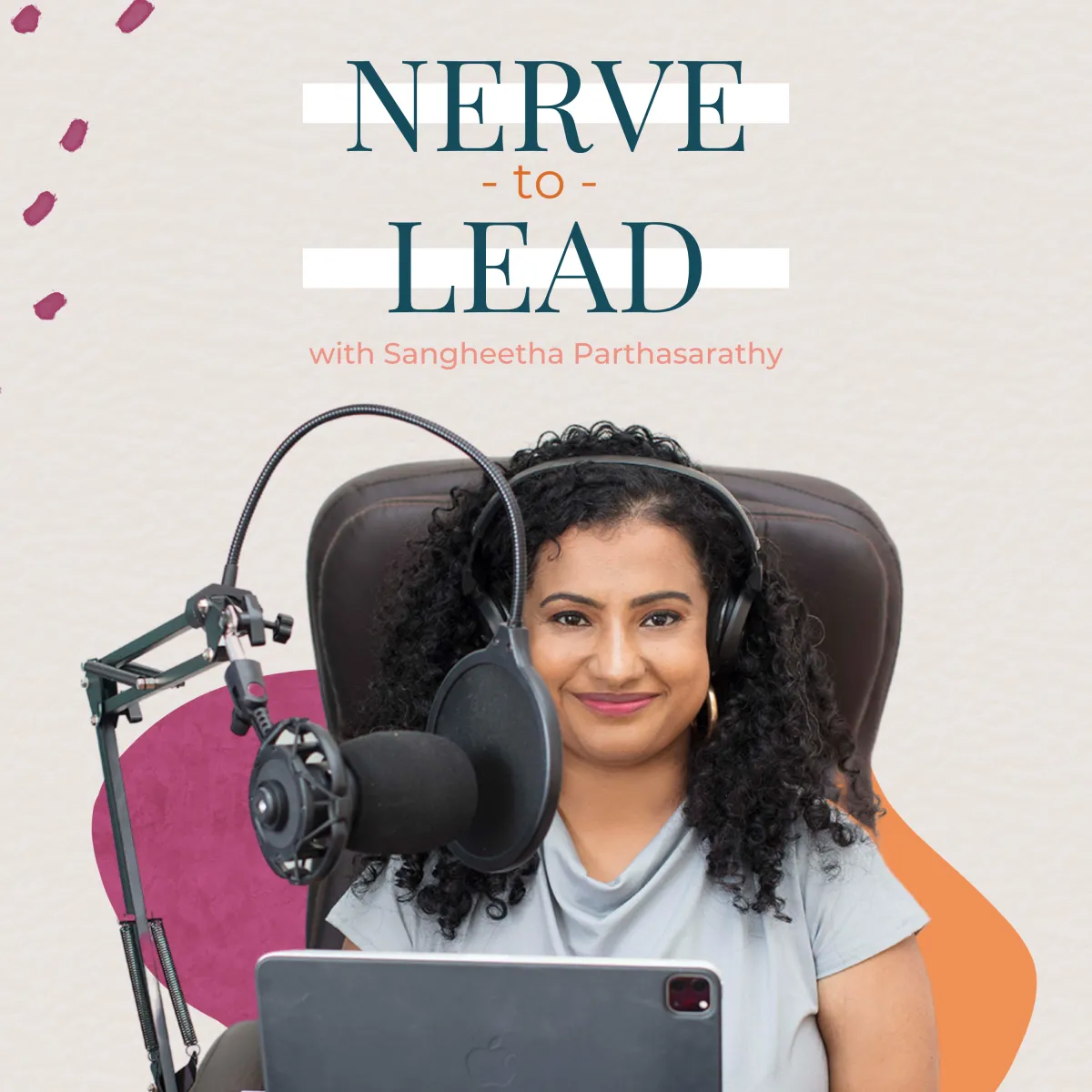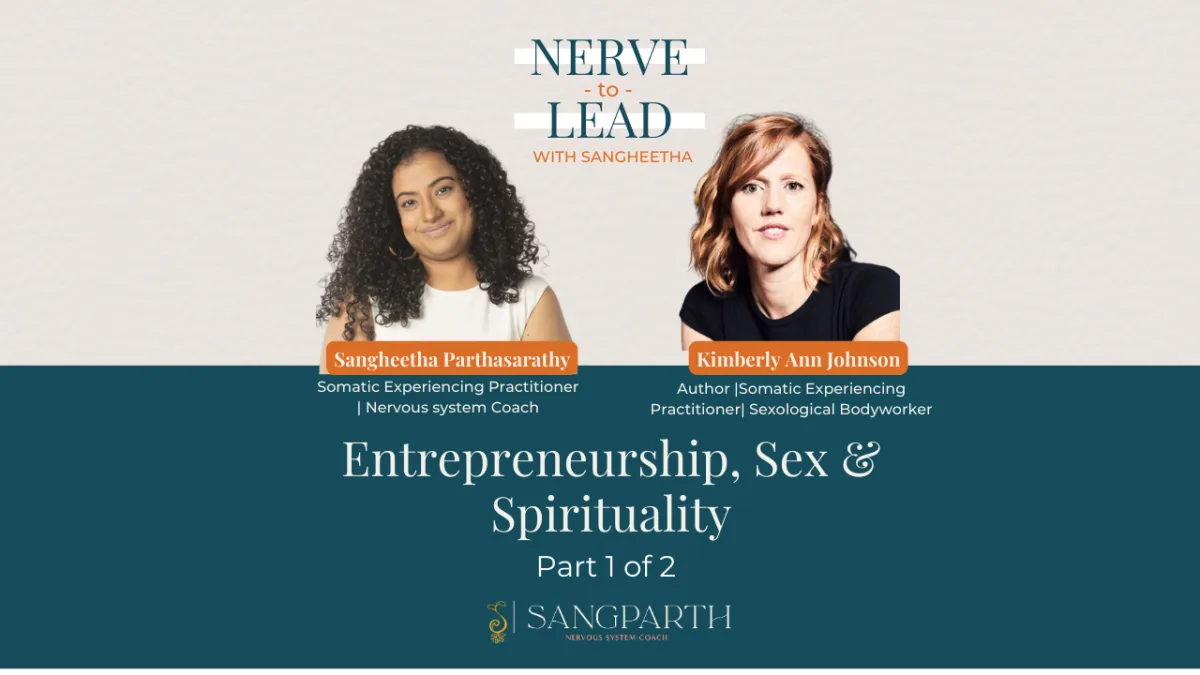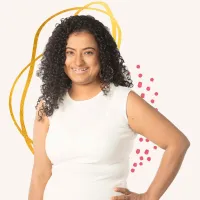The Nerve To Lead Podcast
with Sangheetha Parthasarathy
On The Nerve to Lead podcast, your host, Sangheetha Parthasarathy encourages CEOs, Entrepreneurs, deep thinkers, the round-pegs-in-square-holes, change-makers and visionaries to share their stories of power, pleasure and passion.
We cover everything from nervous system regulation, high achievement, trauma healing, parenting, partnership and attachment, intimacy and more. You will also get to learn the stories and knowledge from our expert guests and thought leaders.

Apply to be a guest on
Nerve to Lead Podcast
Welcome to 'Nerve to Lead' podcast. Apply here to be a guest on the podcast with Sangheetha Parthasarathy.
Invite Sangheetha as a
guest to your podcast
Invite Sangheetha, a Nervous System Coach, Speaker and Consultant to be a guest on your podcast.

Entrepreneurship, Sex & Spirituality (Part 1 of 2)
Kimberly Ann Johnson is a bestselling author, doula and entrepreneur. In part one of my conversation, we discuss entrepreneurship, sex, spirituality and the South Asian nervous system through the post-colonial lens.
You can connect with Kimberly on her website: https://kimberlyannjohnson.com/
LISTEN TO THE EPISODE
EPISODE TRANSCRIPTS
INTRODUCTION
Welcome to the Nerve to Lead podcast. Here we explore power, pleasure, leadership, identity, belonging, parenting, and couplehood, and explore stories of navigating through life, finding both authenticity and attachment through the common lens of the nervous system. I am your host Sangheetha Parthasarathy and I'm so glad you're here.
Today I have Kimberly Ann Johnson with me. Kimberly is a sexological body worker. She was a doula, and I just love her work. Thank you so much for joining us today, Kimberly.
Thank you so much for having me.
HOW DID YOU BUILD A NEW FORM OF ENTREPRENEURSHIP
So I'll start off with like an entrepreneurial question and then maybe we can jump a bit more into the work. I am a former doula, I'm a somatic experiencing practitioner, feminist, and your work just resonates with me at so many different levels. So I'll start off with this. I think when I look at you and I've been following your work for a really long time, and I think it's just beautiful what you've created. I mean, if you were to look at it as a business niche or use terms like that, but I really see your work as sitting at in the intersection of activism slash therapy slash thought leadership slash coaching. And I don't know, it's just beautiful what you've created and it feels like you've really forged a path for yourself that feels authentic, but also playing well within the system, but also managing to stay authentic. So tell us about this, the journey as a business owner, as an entrepreneur.
Hmm. Well, thank you for that reflection. That's a beautiful reflection. I definitely, I did grow up in a family of entrepreneurs, so I did have some exposure to entrepreneurial thinking, but my origins are in yoga and I really thought of that as my calling. I never set out to be a yoga teacher. I just loved practicing and the way to practice more was to do trainings. Then people started asking me to teach them back in the days when there wasn't yoga everywhere in the US And so it was really when I became a mother that I had to get real about making it a career. And that was very challenging for me because it was my spiritual path, it was my devotion and it felt somewhat like I was, I don't know, either selling out or selling the power of what it is to make it a business.
But once I became a single mother, it was either make this into a business or make another business. And as you probably know, my first book is really about the experience that I had, becoming a mother and the experience that I wish that all women could have as they become mothers. And I've come to really love certain aspects of business that I resisted a lot, which is selling, basically marketing and selling because I just use them as teaching opportunities and I love to write. So I like to create narratives with photos and writing and really kind of democratize specialized information. And then I've had a lot of fun with, as the kind of numbers have grown, not only financially, but the people that I'm reaching and teaching, it's been really, really wonderful to be able to crowdfund for different causes that I really believe in. And so my community raised $85,000 for a black-owned birth center in San Diego, raised money for a black single mother in Sweden to go to art school, for a beloved birth member, birth worker in our community for her postpartum period.
So, I was very reluctant to enter quote unquote capitalism and be a part of the system. But becoming a mom basically forced me into it. Either I was gonna have to just be a recluse in the forest, which was gonna be a hard road for someone who grew up in the suburbs, or I was gonna have to learn how to make it work. And so I have made it work and of course there's a lot of bumps along the road right now. My businesses, a lot of it is online and I get tired of being in front of a computer. And especially as someone who had a hands-on body work practice for a long time, I'm craving more in-person experiences. And so now that's what I'm creating more with my work.
THE DICHOTOMY BETWEEN MAKING MONEY AND MAKING IMPACT AMONG HEART-CENTERED ENTREPRENEURS
Thank you so much for that. I think this piece about the capitalism and the structures that you talk about totally resonates with me as well. I used to be a strategy consultant and then I had two planned home births, while I was in the UK. And as it does, one of it was a planned home transfer, and then the other, my younger one was born at home. And then it was a real reckoning of sorts for me and, really forces you to reckon with the feminine and parts of yourself that you have had to minimize to be in a very masculine driven workplace. And I've been through my own, i think, journey with as you do, you pendulate and then finding what works for you. But especially in your work and in this community, I think you talk about it a lot, about this dichotomy between, you know, like money's bad and hospital births it's very polarized in these times and that's why I think I love your voice. I think there are a lot of very polarizing voices in the times that we live in. How did you, tell us about that a little bit, if you can?
LIVING IN A POST-PANDEMIC POLARIZED WORLD AND WHAT IT DOES TO IMPACT WORK
Oh boy. Yeah, it is a very weird time that we're living in where we have less contact with people, probably than we ever have, where a lot of things are depersonalized so we can behave in ways online that we would never behave in person. I think we're losing stamina actually for being in person. A lot of therapists I know are like, well, I don't wanna be in person anymore. It's easier for me to be online. So there's a lot of default to distance and to something that on some level of our system registers as connection, but on another actually doesn't satisfy it at all. It's a quandary of our time, essentially focus, a lot of people come to me because they wanna have better sex and they imagine that that means wanting things that they don't want or learning how to want them or all kinds of configurations. But essentially like, first it's just, can we be present and can we focus? And that we weren't so far away from that five or 10 years ago.
POST-PANDEMIC SOCIAL ENGAGEMENT NERVOUS SYSTEM
Now, everything is challenging us to maintain a sense of connection to ourselves and to physical material reality. There's a lot of rhetoric out there that's encouraging more connection to our morals and our ideologies than to our physical reality. So I sometimes have a feeling that I'm gonna be left back on a branch of homo sapiens and that there's sort of like a new emergence that's much more neo frontal cortex, virtual artificial intelligence, don't need contact. Robots are fine. and I'm kind of digging my heels in over here because, when it comes to birth, for instance, like we can have ideas that are not moral, that are physiological, that yes, it does matter how babies are born. Yes, it does matter where they're born, that can be very confusing for a lot of women because they've been told it doesn't matter. You know, a cesarean birth is a birth, but what we know from trauma and physiology is that the body registers that as invasion. So it doesn't matter what we think about it, the body itself is gonna be what chooses.
And I have a big investment in this because I have a 15 year old daughter. So the other day I had my first thought that I recall having then I'm glad I won't live long enough to see the outcomes of some of the things that are happening right now. And then the next thought was, but this is the world I'm leaving for my daughter. So, I have to remain engaged and listening. I listen a lot, but I also I have to remain true to what I know, not just in my own body, but from working with thousands and thousands and thousands of women. And it literally is that many now, I did 800 sessions in three years in person specifically with birth trauma, sexual trauma, and gynecological surgeries. And now I've been teaching online and I think there's like over 12,000 students that have been through the classes.
TWO SIDES OF POLITICAL CORRECTNESS
And so I just, I know how our ideas cannot override the safety of our body and not safety from these politically correct ways of observing it. In fact, the political correctness oftentimes allows us to override what our present moment perception is because we don't want to feel the thing that we're feeling, but we are feeling it, and then we externalize it rather than recognizing what's originating from inside of us.
And now a small break to talk about more resources. We've created an autonomic intimacy checklist for couples, which gives you a framework to understand nervous system to nervous system safety with your partner.
https://www.sangparth.com/intimacy-checklist-form
It's free to download and use. It is available as a link on the episode show notes, and now back to our conversation.
That's beautiful. Thank you so much. But I can resonate with so much of it, having daughters and really reckoning with what is this world that I'm raising them in and, all these connotations about what you said about the very neo frontal cortex, AI, not much.
BIOLOGY OF EARLY ATTACHMENT
And then I'm also wondering, yes, I mean, that's probably for adults, but also as you know, for children and infants, the whole attachment piece and the touch and the movement and the early attunement and how that sets our whole nervous system up. And it's fascinating to sort of and a bit scary to reckon with the impact of that. I wanted to shift gears a little bit and talk about, your work specifically.
SEX AND SOUTH ASIANS
I think what fascinates me is when you talk about sex and the prerogative to have sex that changes the world, you also talk about motherhood and how we've lost that sensuality as the mother. Your latest audiobook reclaiming the feminine, it's just wonderful. You talk about feminist sex and, and I know that it's a large part of your practice, but also that we can't actually separate birth from sex, from medical trauma, and all of those are so interrelated. A little bit of a perspective of where, you know, giving a context to this question is, I grew up in India and we are known as the land of the kamasutra, but the India that I grew up in had this dichotomy between the mind and the body, and there was an extraordinary preoccupation with saying that the soul and the mind are superior to the body.
And there is a lot of context around this duality and what it means in real life, including gender discrimination, including menstrual segregation, including wounded masculine leaders who then become charlatans and fake spiritual leaders causing a lot of trauma for people around them. And I, I think about that as power and looking at the feminine, yet there is a lot of divine feminine representations on the one hand. And then there is the reality of what that culture is in real life. So this is where I think I really wanna talk about your work situating it in that context of reclaiming the feminine. Tell us about that. And I know that you also have a background in yoga and you have some experiences of living here also.
Yeah, I mean, I have a lot of opinions and experiences.
THE SEXUALITY VS SPIRITUALITY BINARY
I've lived in India different times, so I was there, the last time I was there was a long time ago, was in 2003, and I was there for six months. And I would say like my spiritual upbringing is really in Advaita Vedanta and non-dual awareness and like the ways that shapes itself inside of practice. This thing between Mind and body is sort of worldwide, right? Like this, it's every major religion has this separation. That spirit is something that's out there and that's good inherently, and that the body is something that's inherently dirty and inherently like a burden and like the thing that's weighing you down. And then there's some contemporary interpretations and Tantra, not neo tantra, but like original Tantra, that consciousness is everywhere. So nothing can be a hierarchy that it's all just as good, but we know that in practice that's not the way that it's internalized and there's a lot of warnings about every purity and like in general, I would say worldwide, there's a feeling that the more sexual you are, the less spiritual you are and the more spritual you are, less sexual. Oh my god, yes, you hit, that's it, right?
SOUTH ASIAN PURITY CULTURE
Like that is it. Growing up it's always that sex and sexual thoughts get in the way of preaching God. And that's it and then also that the female body itself is temptation, whereas the male mind can be driven towards that dichotomy and then also the womb and the periods and the taboo around it and being excluded from religious rituals when you're menstruating and all of that sin around that, taboo around that. That's it. I mean, I think that's the thing, right? Like you internalize this thing that in order for me to reach higher levels of consciousness, one has to somehow eschew the model, especially the reproductive urges in both men and women, but specifically women because they have a womb, and give birth. And also not just sexual, just desire overall right?
DESIRE AS DANGER
That any kind of desire is somehow dangerous. And then we see what happens when that's repressed. So the imagination that we would somehow overcome those and that they're inherently distracting. Then for women, they had to flip a switch where all of a sudden it's like their whole life, they wanted to get married and then they get married and then all of a sudden they're supposed to go from being really proper and reserved and covered to all of a sudden be available. And that's not how our bodies work, right? And so there's all these things coupled with nudity, because nudity is also something that you only share in certain contexts, right? Even touch, you're not really supposed to touch beforehand. So this might be the first time you've come into contact with male genitals at all. It might be a naked body.
And then on the other hand, because porn is so prolific, the males have seen all kinds of things and their expectation is based on all of these kinds of visuals and imagination of what a woman might want, which is really usually not what women want at all, because porn is made for male arousal trajectories and male desire. So there's a lot of education on both sides, that I somehow, I always ended up in these conversations with girls and women trying to help them understand. They were basically like always in some kind of argument with their husband because their husband always wanted more sex, and they were always feeling uncomfortable and avoiding. And I was trying to understand what they were avoiding. And then I realized, it's because this is like a race to penetration and there's very little touching, kissing, contact. And so it's usually painful. And so once it's painful, then you're trying to avoid what's painful and there's just so much misunderstanding. And then of course the body is recoiling because it doesn't wanna be open or available to something that's not pleasurable and not about them. And there's like a lot of dissociation happening and a lot of confusion and not very many places to talk about it.
You know, I don't wanna come off as like this white woman who thinks like, oh, poor Indian women, and India made me who I am and I learned so much about everything through all of my time there. And The dynamics I'm describing are certainly present in other countries in the world, including my own country. And it's just that we also can't abstract everything because there is a certain cultural heritage and lineage and 100% the way that I was susceptible to being, I don't like these words abused in all of these now because they're just overused and they're used in place for being more specific and talking about what happened.
KIMBERLY'S EXPERIENCE WITH GURU AND SEXUAL TRAUMA
But I got in a very complicated relationship with a guru who is only my guru. Like he's not famous, he doesn't have a bunch of other students. Because of going so deep into non-dual awareness, basically believing that the mind is better than the body, music is better than dance, anything that's less associated with the body is better. Then when he wanted to be sexual, it was like and I said well I don't want to, it is like well, why aren't you? Where's your universal love? Like how come you're not devoted? Because you also won't like, your body is just a projection of the cosmic mind. So why do you want ownership over it? And in this kind of hierarchy where the body is lower, it does make us susceptible to being willing to do things or imagining that this, because there's also this idea, from the Gita, that the body is just this suit and we're gonna discard it, but the soul will live on, right. That doesn't allow us to say, my body's my own in this lifetime, and I will deal with it what I want.
SPIRIT VS SOUL
And for me, a huge piece of that came when I understood the difference between a spirit and a soul. And I didn't really come across that much in my philosophy studies, but maybe just hearing it in a western way I could get it was that like spirit is the thing that is untouched and that's universal and that lives in all of us, but our soul is our individual constellation of what that spirit is. And our soul can definitely have desires and preferences and direction, just like each of us have a swadharma like it's our soul is, that's part of it. So there's a lot, there's a lot there.
DANGERS OF THE WEST IDEALIZING INDIAN CULTURE
And it's interesting to think because ofcourse in the west we idealize a lot of cultures in the east, including Indian culture. And where I was introduced to the sacred window was in India. The first time I ever felt what it felt like to have an intact mother baby relationship postpartum was in India where a woman was at her mom's house and being completely taken care of. And she was just basically, there was like a golden aura to it while everyone was serving her. But I know that that's not always the whole story, you know not, number one, it doesn't always happen. But also that there's a larger context and a lot of it comes through modernism and globalism and the importation of believing that other cultures know how to do it better, believing that medicalizing things is safer.
SOUTH ASIAN INTERNALIZED COLONIALISM
And yeah it's internalized colonialism, the white first notions. You know, because we were colonized for so long. I mean, you see that internalized in so many ways. And I'm talking about myself as well. It's been a big journey to decolonize the mind and decolonize the practice, decolonize Somatics, in terms of what I'm offering and what I will start, there is still this huge cultural element about safety and belonging and boundaries and where the individual ends and what belonging is and what othering is very different, I think. So it might be very tempting to slap labels on it. Also, I think a lot of what we call resources and green and ventral states that come from cultural practices it's really complex to decouple that from that collective trauma layer.
CLOSING AND END CREDITS
And this concludes the first part of my conversation with Kimberly. See you on the next episode where we talk more about sex, spirituality, embodiment, and entrepreneurship. Thank you for joining me today on Nerve to Lead Podcast. The music you hear in this podcast was created by Sound Creed. You can find their link in the description. Thank you to Vaishnavi and Pavithra in team Sangparth for producing and editing this podcast. Did this episode resonate with you? If it did, please share it with your friends, family, coworkers, or clients. We would also love to hear from you. Drop us a note on www.sangparth.com.
Thanks to Sound Creed for the music, you can visit them here https://www.youtube.com/@SoundCreedLLP
Curious about the work? Visit www.sangparth.com and book a free 15 minute call https://www.sangparth.com/15min-call
What we offer
Our Areas Of Focus

Career, Entrepreneurship& Leadership

Sex, Relationships
& Parenthood

Eating, Movement &
Body Image

